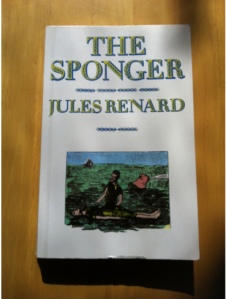Feeling self-conscious about my financial dependence as a student, I stumbled upon and bought The Sponger in a charity bookshop in Edinburgh two years ago in the hope of finding some solace in leeching money shamelessly. Jules Renard is most famous for a short autobiographical novel, Poil de Carotte, that depicts his sad childhood experiences of having both unloving parents and ginger hair, which I also bought there and then to take home to likewise gather dust on my bookshelf. According to its preface by Edward Hyams, The Sponger was voted as one of the twelve best French novels of the nineteenth century by a panel of prestigious French writers. I certainly enjoyed it because I am a sucker for simple plots and laconic narrative voices.

Pics or it didn’t happen, they say
Henri, the eponymous sponger, befriends Monsieur Vernet and his wife, their three-way relationship cemented by the couple eating up the exaggerations and embellishments Henri makes about his bohemian lifestyle and supposed artistic standing. Henri agrees to accompany them on holiday and thanks their hospitality by doing Vernet over like a kipper and going after his wife and subsequently his niece.
Henri is adopted by the Vernets to make their lives more romantic and less dull, and Renard uses the clumsy love affairs to illustrate the problems behind giving in too much to Henri’s poetic bohemian ideal or else sticking to orthodox bourgeoisie values of fidelity, particularly when Henri’s representation of himself is grounded in deceit and artificiality. Henri is aware that he is ultimately a despondent man of letters but that does not stop him from constructing a false image of himself as a sensitive poet who writes under a made-up pen name for the papers and eats at obscure restaurants you’ve probably never heard of.
The original French title for this novel is L’Écornifleur. I’m not entirely sure what the etymology behind this word is but I found it interestingly appropriate that the word “sponger” was used to exemplify Henri’s parasitical nature. When falling in love with Vernet’s wife and niece, the two locations involve bodies of water; firstly, his love for Mme Vernet is kindled by their walk along the jetty and at the seaside embracing “the phosphorescence of the sea”, then secondly when Henri gets up close and personal teaching Vernet’s niece how to swim. Henri becomes like a sponge, absorbing his inspirational physical surroundings as well as the generosity and sympathies of others, only to release what he has absorbed in an antithetical way, whether he is lachrymose on his “bench of tears” in indulgent throes of sensibility or “pour[ing] out claptrap” to appease Mme Vernet.
“My sponger’s heart empties and fills itself like the metal cup chained to a public fountain”
The hopelessness of this tortured-artist type and the gullibility of the bored bourgeoisie is Renard’s focus of satire that ends on a morally ambiguous note as Henri pushes the boundaries with Vernet’s niece. Could the justification of his conduct be that he at least made the Vernets’ lives more interesting?
“They have no children and are bored. I have come into their lives at the right moment. Their notion of a poet may be described as an amended prejudice: that is, while they no longer conceive of him as a lean madman, a visionary, a starving parasite, legendary and dangerous, they still regard him as an exceptional and eccentric human being”
I read The Sponger with the expectation that the protagonist would be a lovable rogue but I do not feel disappointed by the charmlessness of everyone in the novel. I think the whole point of Renard’s satire was that every character is too unlikeably romantic for their own good, to the point where the Vernets cannot see they are being taken advantage of, and Henri demonstrates that there is little poetry or redemption in sponging off of others. Only when Henri leaves them for good is his conscience clear.
